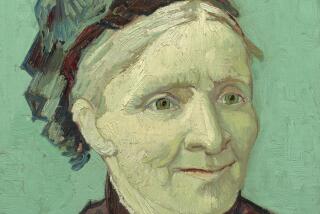Mediation Ordered in Suit Over Klimt Paintings
- Share via
The U.S. 9th Circuit Court of Appeals ordered Austria and a Cheviot Hills woman suing for possession of Gustav Klimt paintings seized by the Nazis to attend court-supervised mediation.
A Los Angeles federal judge ruled last year that Maria Altmann’s lawsuit against Austria could go forward in U.S. courts, but Austria’s lawyers appealed that decision, saying U.S. courts lack jurisdiction.
At the center of the dispute are six paintings that the lawsuit values at $150 million.
Among them is one of Klimt’s most famous paintings, the “Portrait of Adele Bloch-Bauer I,” a shimmering, gold-encrusted work treasured as an early landmark of Austrian modernism. A portrait of Altmann’s aunt, it was taken from her uncle’s house and delivered to the Austrian Gallery with a letter reading “Heil Hitler.”
The 9th Circuit order did not address the jurisdiction issue. But after hearing arguments March 7, the three-judge panel directed both sides to “explore a possible resolution through mediation” with a mediator who is to report to the court every 30 days on the talks.
“This panel is of the view that mediation could bring a resolution that would serve the parties better than results achieved through litigation,” said the court order, dated March 20.
Scott Cooper of Century City’s Proskauer Rose, which is representing Austria, said he did not see the mediation order as a victory for either side.
“It’s hard for me to imagine that either side would view this as anything but a procedural step in the process,” he said.
Whether mediation will foster a resolution was not immediately clear. Both sides have said they were willing to pursue the case to the U.S. Supreme Court.
Austrian diplomats have said privately that offering a settlement might be viewed as tantamount to admitting guilt. It could also encourage other families to claim other artworks now held in Austrian museums.
“My position is I’ve always been in favor of discussing a resolution,” said Randol Schoenberg, the attorney representing Altmann, and the grandson of the famous Vienna composer who fled Nazi Germany and settled in Los Angeles.
“If this would bring Austria to the table, it’s a good thing,” he said, adding: “They should return the paintings.”
Austria contends that the paintings were willed to the National Gallery by Adele Bloch-Bauer, and that U.S. courts have no jurisdiction over the dispute.
The family contends that Bloch-Bauer made a nonbinding request to her husband, Ferdinand Bloch-Bauer, to hand over the paintings after his death. They say his will--written after the Nazis murdered his friends and scattered his family--named Altmann and several other relatives, who have since passed away, as his heirs.
Altmann’s lawsuit says that the seizure of the paintings by the Nazis--along with Bloch-Bauer’s house, castle and an enormous art collection--shows that they did not end up at the Austrian Gallery through any legal bequeathal.
The jurisdiction issue is a tricky undercurrent in the dispute, because the Foreign Sovereign Immunity Act ordinarily precludes a country from being sued in U.S. courts. But there are exceptions.
The Altmann lawsuit argues that Austria is not entitled to immunity in this case because the paintings were stolen by the Nazis in violation of international law, and their images are being marketed by the Austrian Gallery in the United States.
“Here you have some very unusual circumstances,” said Arthur Hellman, a professor at the University of Pittsburgh Law School who is an expert on the 9th Circuit Court of Appeals.
“You have a sovereign nation with which the U.S. is on good terms,” he said. “The court may have wanted to avoid a jurisdictional issue.
“I would suggest that mediation is something the federal court shouldn’t do unless it is satisfied it has jurisdiction,” he said.
Hellman said the mediation could be read as a simple procedural step on the way to a court resolution yet to come. Or “it may be that the court thinks that one of their mediators could find a way of enabling Austria to settle without the consequences Austria is afraid of,” he said.
What could Austria offer Altmann to settle the case?
“We’re a long way from having concluded what might or might not be possible,” said Austria’s attorney Cooper, who learned of the court order Friday.
Cathy Catterson, a spokeswoman of the 9th Circuit, said: “If the case doesn’t settle, presumably the three-judge panel would issue some sort of decision.”
Maria Altmann, 86, said she originally tried to pursue the case in Austria but could not afford the required court deposits there. She said she would be “delighted” to sit down and talk about her claim.
“We were always willing to talk to them. They were never willing to talk to us,” said Altmann, who fled to Holland in 1938 after her husband’s release from Dachau.
The couple moved to Los Angeles and her husband took a wartime job as a Lockheed engineer.
“They have to acknowledge that the paintings belong to us,” she said. “I hope that this is going to bring a solution and this is not another way for the Austrians to delay, delay, delay until I die. I want to live to see the paintings.”
*
Times staff writer Henry Weinstein contributed to this report.
More to Read
The biggest entertainment stories
Get our big stories about Hollywood, film, television, music, arts, culture and more right in your inbox as soon as they publish.
You may occasionally receive promotional content from the Los Angeles Times.










